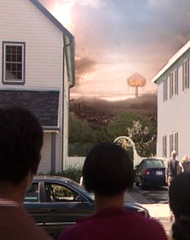At what point does advertising stop being communication? An article in Adweek seems to beg the question as Eleftheria Parpis mentions that more agencies and companies are considering advances in neuroscience to be the final frontier in convincing consumers to buy products and politicians.
Neuroscience is amazing, especially as a tool in post-analysis research. It’s the reason we understand why Coca-Cola is a brand champ or why certain Super Bowl ads, despite what consumers said, outperformed others during the 2006 Super Bowl.
One of the takeaways from the latter study was how the Disney advertisement fired up the brain while a FedEx ad that ended with a funny scene where a caveman is crushed by a dinosaur was perceived as threatening by the brain. Last year, Coke became a client of EmSense to help it decide which two TV ads to place in the Super Bowl. (It was the first time the company used brainwave and biometric data to help select and edit its Super Bowl ads.)
The emphasis on neuroscience is because advertisers and marketers are noticing the steady decline of what was once considered the king of all advertising vehicles — the :30 television spot. As the entertainment industry moves toward on-demand programming with fewer interruptions, the best advertisers already know that gimmicks, tricks, gags, and heavy buys are no longer a formula for success.
Even with a better understanding of consumer engagement on the unseen psychological level, smart advertisers admit: the more they know, the less they know. For example, even a neuroscience-backed advertisement doesn’t stand a chance when it’s fast-forwarded on TiVo. And, the successful Disney advertisement didn’t necessarily sell more vacation packages nor does it consider the decades of branding behind the single tested commercial.
It also doesn’t consider the Heisenberg Uncertainty Principle. Simply put, the concept is that if you watch something, like an atom, it may respond differently because the observation influences behavior.
Add it all up and while the work is important well beyond selling you a soft drink, it all points to one thing. Everybody wants assurances and, frankly, they just don’t exist.
"When economic times get difficult, clients get nervous, and when they get nervous, they want guarantees," Jeffrey Blish, partner and chief strategic officer at Deutsch/LA, Marina del Rey, Calif, told Adweek. "There has always been an interest in trying to make your marketing efforts more bulletproof. It ebbs and flows depending on the business climate."
He’s right, but it goes even deeper. Consumers want guarantees too. Not only do they want better products, but their expectations also change with engagement. It’s something advertisers might consider as they delve deeper into social media.
As consumers strengthen their connection to advertisers, marketers, programs, and companies, the entire paradigm of how they see brands shifts in sometimes unexpected directions. Add in the idea that as consumers understand that they are being observed, they might behave differently. Or, in other words, sometimes what seems to be is not what is or will be. Social media is very much like that.
Most often, people consider social media to be an “advent” or “evolution.” But I am not always so certain. Maybe it’s much simpler than that. We were watching HBO’s John Adams miniseries yesterday. And as a man on horseback rode by the Adams home announcing the attack on Lexington and Concord, my wife noted the obvious. “Huh,” she said. “Social media.”

Neuroscience is amazing, especially as a tool in post-analysis research. It’s the reason we understand why Coca-Cola is a brand champ or why certain Super Bowl ads, despite what consumers said, outperformed others during the 2006 Super Bowl.
One of the takeaways from the latter study was how the Disney advertisement fired up the brain while a FedEx ad that ended with a funny scene where a caveman is crushed by a dinosaur was perceived as threatening by the brain. Last year, Coke became a client of EmSense to help it decide which two TV ads to place in the Super Bowl. (It was the first time the company used brainwave and biometric data to help select and edit its Super Bowl ads.)
The emphasis on neuroscience is because advertisers and marketers are noticing the steady decline of what was once considered the king of all advertising vehicles — the :30 television spot. As the entertainment industry moves toward on-demand programming with fewer interruptions, the best advertisers already know that gimmicks, tricks, gags, and heavy buys are no longer a formula for success.
Even with a better understanding of consumer engagement on the unseen psychological level, smart advertisers admit: the more they know, the less they know. For example, even a neuroscience-backed advertisement doesn’t stand a chance when it’s fast-forwarded on TiVo. And, the successful Disney advertisement didn’t necessarily sell more vacation packages nor does it consider the decades of branding behind the single tested commercial.
It also doesn’t consider the Heisenberg Uncertainty Principle. Simply put, the concept is that if you watch something, like an atom, it may respond differently because the observation influences behavior.
Add it all up and while the work is important well beyond selling you a soft drink, it all points to one thing. Everybody wants assurances and, frankly, they just don’t exist.
"When economic times get difficult, clients get nervous, and when they get nervous, they want guarantees," Jeffrey Blish, partner and chief strategic officer at Deutsch/LA, Marina del Rey, Calif, told Adweek. "There has always been an interest in trying to make your marketing efforts more bulletproof. It ebbs and flows depending on the business climate."
He’s right, but it goes even deeper. Consumers want guarantees too. Not only do they want better products, but their expectations also change with engagement. It’s something advertisers might consider as they delve deeper into social media.
As consumers strengthen their connection to advertisers, marketers, programs, and companies, the entire paradigm of how they see brands shifts in sometimes unexpected directions. Add in the idea that as consumers understand that they are being observed, they might behave differently. Or, in other words, sometimes what seems to be is not what is or will be. Social media is very much like that.
Most often, people consider social media to be an “advent” or “evolution.” But I am not always so certain. Maybe it’s much simpler than that. We were watching HBO’s John Adams miniseries yesterday. And as a man on horseback rode by the Adams home announcing the attack on Lexington and Concord, my wife noted the obvious. “Huh,” she said. “Social media.”





















